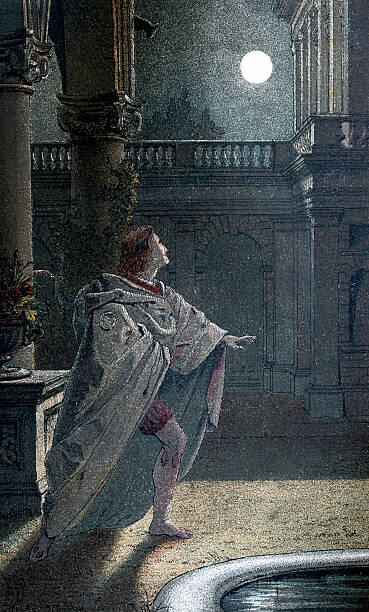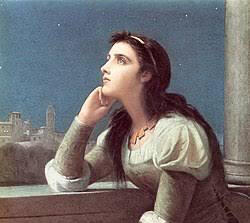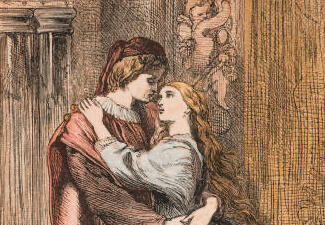Presentation Title:
Two Voices, One Tragedy
Choose 1 Experience to Observe. Do not access the other. After your Observation, do Experience Share with an Observer of the other Experience.

Experience A: Romeo
The night was hot and still. Verona slept, and I felt awake in the wrong world. The street smelled of dust and old wine. I had been drinking.Benvolio said I was foolish, but what did he know about being in love?
There was a house lit with candles and laughter. They said it belonged to Capulet. I went anyway. I did not think of danger. A man doesn’t think when he is already lost.Inside, there were masks and colors, women laughing, men drinking, servants moving quick. I felt out of place, like a man on a ship where he does not belong. Then I saw her.
She moved through the room like quiet water. Her eyes stopped when they found me. The noise fell away. The candles looked small beside her face. I asked her name. She said it softly, like a prayer she wasn’t supposed to say. Juliet.We spoke in half-whispers. I touched her hand. It was small, but it burned. She said she should not speak to me. I said I didn’t care. When I kissed her, it was simple and true, the way a thing should be when it matters.Later I learned her name meant enemy. Montague and Capulet — two sides of the same broken city. It should have ended there, but I went back to find her. I climbed her wall like a thief. The moon hung over the garden, white and watching.She stood above me, pale and sure. She said her love would ruin us both. I said ruin was better than emptiness. We swore we would be together. It was foolish, but all true things are.When her cousin fell by my hand, I felt the world tip. Blood has a smell that stays with you. I didn’t want to fight him. I only wanted peace, but peace dies easy in Verona.They banished me. I left, but she stayed. Every mile away from her was another cut that didn’t bleed. I wrote, I prayed, I dreamed. Nothing helped.When the message came, it said she was dead. I believed it. I didn’t ask questions. I only went back to her.
She lay there still, white as the moon had been that night in the garden. I spoke to her and drank the poison. It burned clean.Before the dark came, I thought of her hand. Small, warm, alive. I think she called my name. Or maybe that was only my heart, breaking quiet in my chest.And then there was nothing.

Experience 1: Juliet
I was born into silks and feuds,
silver cups clinking with secrets,
where every dance was a warning,
and every smile had a weapon behind it.
They said love was a game,
but I never liked playing fair.
Then he walked in —
a storm with soft eyes,
a stranger wearing moonlight like armor.
He said hello like it was an accident,
but fate was already laughing in the corner.
And when our hands met,
it was church bells and rebellion
under a borrowed mask.
They said his name was a curse.
I thought it sounded like freedom.
We kissed before we knew the danger —
young, wild, and too sure of forever.
That night I climbed to my balcony,
the garden below humming with crickets,
the sky pretending not to watch.
And there he was,
his voice rising up through the leaves
saying my name like a vow he couldn’t keep.
We talked of love like children do,
as if words could build a kingdom
where names don’t matter.
He swore the world could change for us.
I wanted to believe it. I did.
But the world has fathers and cousins and swords.
The world doesn’t care for promises made
under the moonlight.
Then the news came —
Tybalt, my cousin, dead.
Romeo, my heart, gone and guilty.
Love became something sharp that night,
a blade I couldn’t drop.
We planned to run away,
a secret too fragile for daylight.
But time, cruel as rumor,
got there first.
They told me to marry another man.
I drank a potion instead.
It tasted like hope and ash.
I dreamed he’d find me,
wake me,
carry me somewhere the feud couldn’t follow.
But dreams lie.
I woke in the dark,
cold stone, flowers dying by my head.
He was there —
pale, still, a broken prayer.
The poison bottle on the floor
like punctuation on our story.
I kissed his lips —
still warm, still him.
I wanted to follow.
So I did.
They’ll say we were foolish,
that we burned too fast.
Maybe they’re right.
But I’d rather be ashes with him
than air without him.
Because love is war,
and we were both soldiers,
young and reckless,
bleeding poetry.
If I could sing to him again,
I’d tell him:
You were my quiet rebellion,
my first and last mistake.
And if they write songs about us —
let them.Let them say it ended badly.Let them say it was too soon.But they’ll never say it wasn’t real.

Experience Share Guide
🕊️ Questionnaire: “Two Voices, One Tragedy”Perspective Connection:
How does each narrator describe the moment they first meet? What similarities or contrasts appear in their emotional reactions?Tone and Emotion:
Romeo speaks in restraint and simplicity, while Juliet sings in vivid emotion.
How do these differences in tone affect the reader’s sympathy or understanding of their love?Imagery and Symbolism:
Both pieces mention light and darkness (candles, moonlight, night).
What does this imagery represent in each version, and how does it connect their experiences?Voice and Language:
Romeo’s prose is short and declarative; Juliet’s is lyrical and introspective.
How do these writing styles reveal their personalities and their roles in the story?Fate vs. Choice:
In what ways do both perspectives suggest that fate, not choice, controls their lives — or do they resist fate differently?Love and Danger:
Both feel that love and danger arrive together.
How does each narrator describe this tension between passion and destruction?Memory and Time:
Romeo tells his story in past tense — reflective and fatalistic.
Juliet’s poem moves through memory and dream.
How does their treatment of time emphasize the inevitability of tragedy?Gender and Expression:
How do Romeo’s quiet endurance and Juliet’s emotional expressiveness show the different ways they experience the same love?Symbol of the Hand and the Kiss:
Both describe touch as something sacred (“I touched her hand”; “I kissed his lips”).
What role does touch play in their connection and ultimate loss?Conflict and Society:
What role does Verona — their divided world — play in shaping both narratives?
Do they see society as something to escape, to fight, or to surrender to?Imagery of Death and Sleep:
Compare how each voice portrays death.
For Romeo, it’s peace; for Juliet, it’s following love.
What does this say about how each understands sacrifice?The Moon and the Garden:
The moon and the garden scenes appear in both versions.
What do these settings symbolize about secrecy, youth, and fragile hope?Rebellion and Identity:
Both characters reject their family names.
How does each narrator express rebellion — in words, in actions, or in silence?Emotional Crescendo:
Both pieces build toward the moment of death.
How does each voice prepare the reader emotionally for that ending?
(Does one resist while the other accepts?)Unified Theme:
When you put the two together, what single truth or emotion seems to define their shared story?
Is it love, loss, youth, inevitability, or something more complicated?